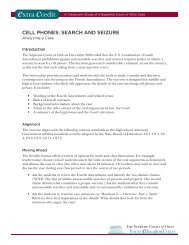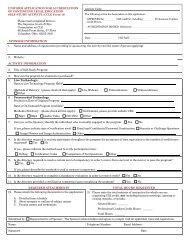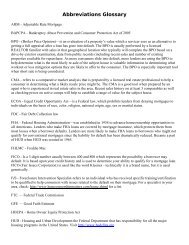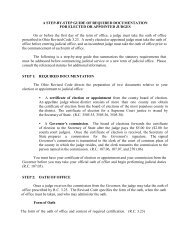Planning for Parenting Time: Ohio's Guide for Parents Living Apart
Planning for Parenting Time: Ohio's Guide for Parents Living Apart
Planning for Parenting Time: Ohio's Guide for Parents Living Apart
You also want an ePaper? Increase the reach of your titles
YUMPU automatically turns print PDFs into web optimized ePapers that Google loves.
Special Issues<br />
• Be sensitive about introducing a new partner into your children’s lives<br />
• Spend some alone time with your own children so they do not feel overshadowed by<br />
the new family members<br />
• Discuss parenting problems with the other parent away from the children<br />
• Avoid any display of favoritism regarding your children<br />
• Let the children choose an appropriate name or title <strong>for</strong> the stepparent<br />
• Plan regular family meetings to discuss all members’ needs.<br />
BREAST-FEEDING<br />
Pediatricians agree that breast-feeding is best <strong>for</strong> most babies. There is no proof, though, that<br />
breast-fed babies <strong>for</strong>m closer relationships with their parents than do bottle-fed babies.<br />
Children develop secure and positive relationships when they have frequent contact with a<br />
parent who holds, talks, com<strong>for</strong>ts and feeds them in a sensitive and caring manner.<br />
<strong>Parents</strong> who are not raising their child together must balance the baby’s need to nurse with its<br />
need to bond with the father. The parents should talk often and openly with each other about<br />
the baby. Breast-feeding should not be used to stop the father from spending time with the<br />
child. Instead, mothers need to offer the father parenting time and fathers need to be flexible<br />
regarding the need of the baby to nurse. A father can feed an infant with the mother’s<br />
expressed (pumped) milk, particularly after nursing routines are well established. If there are<br />
any questions about breast-feeding, parents should talk to the baby’s pediatrician.<br />
CHILDREN WHO DON’T WANT TO SPEND TIME WITH A PARENT<br />
Some children find it hard to go from one parent’s home to the other, and they express these<br />
feelings through their behavior. There are many reasons why some children say they do not<br />
want to spend time with the other parent. Some of the reasons have to do with a child’s age<br />
and personality, while <strong>for</strong> others, it has to do with how their parents get along. How a parent<br />
reacts to a child not wanting to be with the other parent also can affect whether the child or<br />
teen is willing to be with the other parent. Toddlers, <strong>for</strong> example, may not understand what is<br />
happening to them at exchange time and they may cry when they leave one parent. This is a<br />
natural reaction, and these children usually calm down once they are distracted and engaged<br />
in a fun activity. Sometimes children just do not want to stop doing what they are doing<br />
because they are having fun. Other children may not have gotten used a new environment,<br />
and they would rather stay in a home and a neighborhood they know. <strong>Parents</strong> can help<br />
children adjust by understanding their feelings, but insisting that they spend time with the<br />
other parent, just as a parent would do if the child does not want to go to school.<br />
67
















